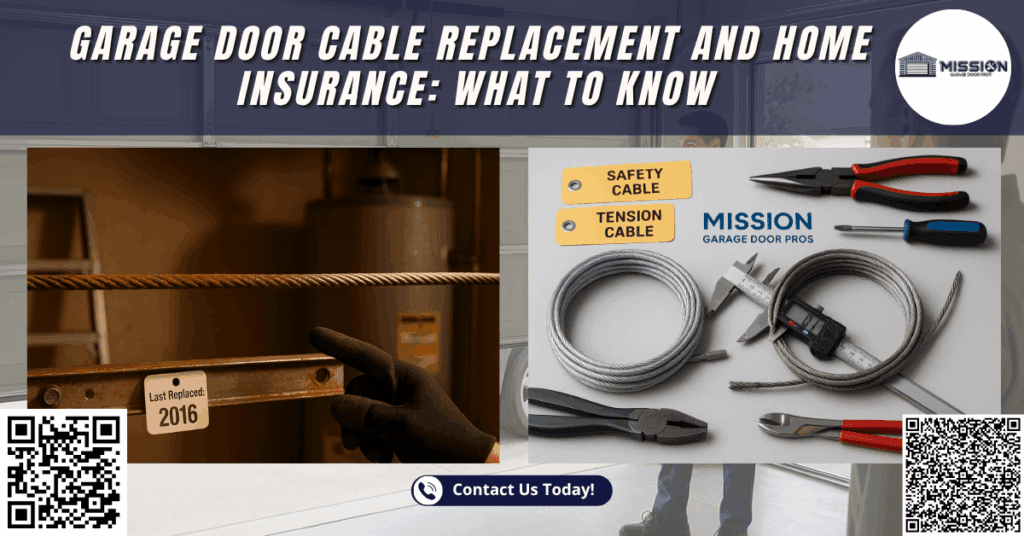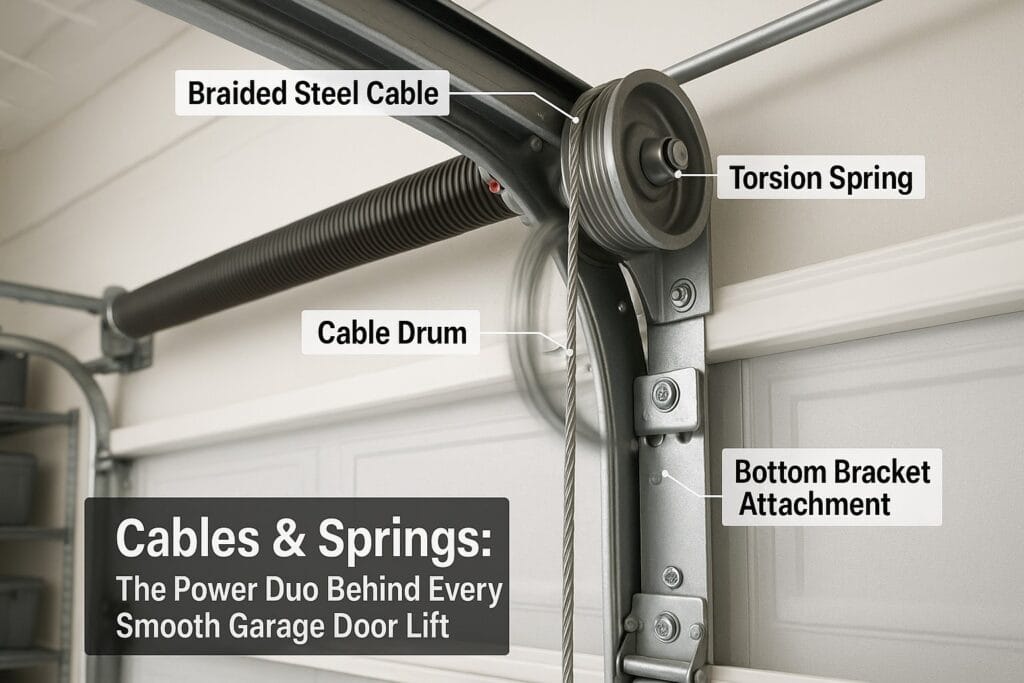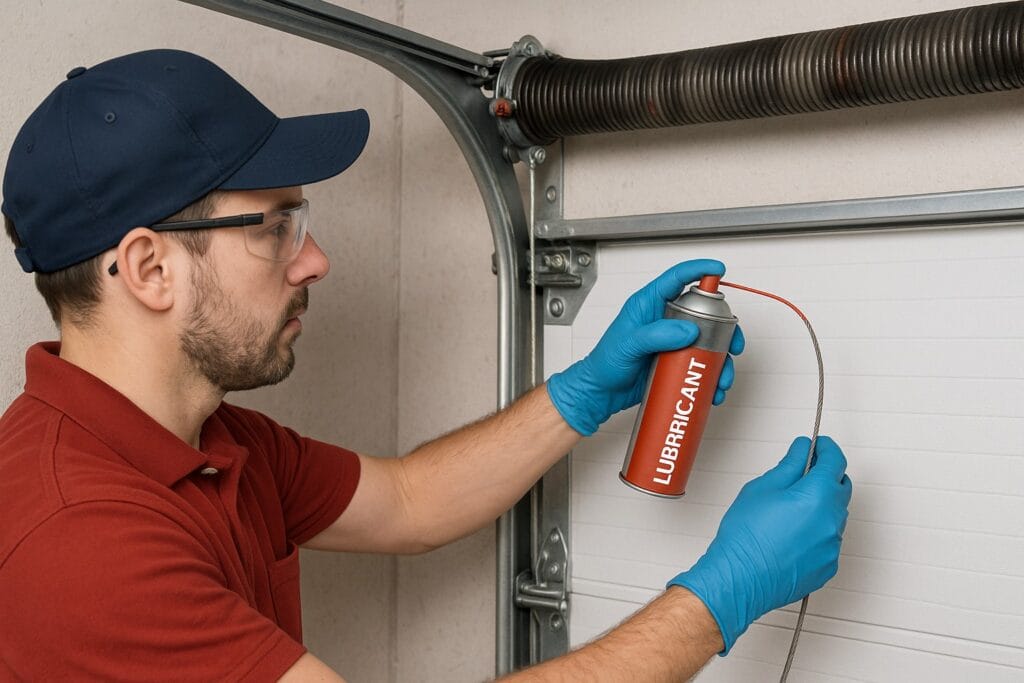Garage Door Cable Replacement and Home Insurance: What to Know

Real-Life Scenario
Imagine you’re heading out to work on a busy morning in Mission, TX. You press your garage door opener, and halfway up, your garage door jerks and stops. A loud metallic snap echoes through the garage. One of your garage door cables has just broken. This common yet dangerous issue can disrupt your daily routine, pose serious safety hazards, and cost hundreds of dollars to repair. At Mission Garage Door Pros, we frequently respond to such emergencies, ensuring families like yours can regain safe access to their homes.
According to industry data, garage doors are the largest and heaviest moving component of most homes, and cable issues account for a large percentage of repair calls. Unfortunately, many homeowners don’t know whether their home insurance will cover such repairs. It can be confusing trying to determine if you’re covered or if you’ll be left footing the bill for the entire cable replacement.
If you’re unsure about what your homeowner’s policy covers, especially concerning garage door cable replacement, you’re not alone. This article offers a detailed, easy-to-understand guide on garage door cables, how they break, what to do when they fail, and whether insurance can help with the repair costs. We’ll cover everything you need to know to keep your garage door system operating smoothly, safely, and efficiently.
What Are Garage Door Cables and Why Are They Important?
Garage door cables are integral parts of the garage door system, responsible for safe and smooth operation. Made of strong, twisted steel wires, these cables work with either torsion springs or extension springs to balance the door’s weight as it opens and closes. These cables function as lifelines that prevent the garage door from crashing down unexpectedly.
Components and Function
- Cable Drums: Located on both sides of the torsion tube, they wind and unwind the cables during door movement.
- Bottom Brackets: Anchor the cables to the bottom of the garage door and help distribute tension.
- Pulleys: Help guide the cables in systems using extension springs.
- Tension: The spring tension in the system assists the cables in lifting the heavy door.

The proper tension and alignment of these cables are crucial for safe operation. Without functional cables, the door becomes unstable and may fall suddenly, leading to property damage or injuries. Ensuring the cables are intact is part of a properly balanced garage door system that provides smooth operation and long-term durability.
Types of Garage Door Cables
Different garage door setups use different cable systems, depending on the spring type and door size.
Torsion Spring Cables
These work with a torsion system, where a spring mounted on the torsion tube above the door creates torque. The cables wrap around cable drums as the door opens, supporting smooth operation. These are commonly used in heavier garage doors due to their efficiency and durability.
Extension Spring Cables
In this system, extension springs stretch along the horizontal tracks. The cables run through pulleys and help lift the door by balancing the extended spring tension. This type is often found in lighter residential doors.
Safety Cables
Some systems also include safety cables that run through the middle of extension springs. These cables help prevent injury if a spring breaks by keeping it contained.
Regardless of the system, regular maintenance and routine inspections are essential for spotting early signs of wear, such as fraying or rust, that could lead to a snapped cable.
Signs Your Garage Door Cable Needs Replacement
Recognizing early warning signs can prevent a complete system failure. Here are the key indicators that it’s time for garage door cable replacement:
Visual Clues
- Fraying or rusted cables: These are common in areas with high humidity.
- Corrosion from moisture, especially in coastal or rainy climates like Mission, TX.
- Slack or loose cables: Indicates a loss of tension or wear at the connection point.
Operational Symptoms
- Garage door hangs unevenly: One side rises or falls faster than the other.
- Door jams or doesn’t close all the way: An uneven pull caused by worn or broken cables.
- Noisy operation with grinding or snapping sounds: Often heard when the cable is about to break.
- Broken cable visible on the ground: Usually near the bottom bracket.
Addressing these issues promptly can prevent extensive damage to your garage door system, springs, and opener.
Why Do Garage Door Cables Break?
Garage door cables are built for strength, but like any component, they deteriorate over time. Here are the main causes:
Wear and Tear
Repeated movement wears down the metal strands, especially if you operate your garage doors multiple times daily. Over time, even the strongest materials fatigue.
Corrosion
Humidity and rain can cause steel cables to rust and weaken. This is common in South Texas. Rust weakens the cable structure and increases the risk of breakage.
Poor Maintenance
Skipping routine maintenance like lubrication and inspection can shorten cable life. Neglected cables also place strain on the garage door opener and springs.
Misalignment or Tension Problems
Incorrect garage door tension places stress on the cables and can lead to premature failure. Misaligned cable drums can cause cables to slip off track.
Damaged Components
Worn pulleys, drums, or bottom brackets can cause cables to slip, fray, or snap, making replacement necessary.
Is Garage Door Cable Replacement Covered by Homeowners Insurance?
Garage door repairs aren’t always covered by insurance. Understanding your policy is key.
Covered Scenarios
Home insurance typically covers damage caused by:
- Fire or storm: Natural disasters causing structural damage.
- Vandalism or theft: Intentional destruction or break-ins.
- Vehicle impact: Such as accidentally hitting the garage door with your car.
If a covered event leads to cable failure, your policy may reimburse you for the repair or replacement.
Not Covered Scenarios
- Normal wear and tear: Considered homeowner responsibility.
- Lack of maintenance: Neglected systems are rarely covered.
- Mechanical failure: Routine part breakdowns fall outside standard coverage.
How to Check Your Coverage
- Review Your Policy: Look under sections for “Other Structures” or “Mechanical Components.”
- Call Your Agent: Ask detailed questions about what applies to your garage.
- Get Professional Documentation: A written statement from a licensed technician helps with claims.
- Take Photos: Document the issue before and after repairs for evidence.
Maintaining records of garage door maintenance can help you argue your case when filing a claim.
Costs of Garage Door Cable Replacement
Garage door cable replacement varies depending on the door type, level of damage, and materials used.
Average Costs
- Cable Replacement Only: $150–$200
- With Spring Replacement: $250–$400
- Emergency Repairs: Additional $50–$100
Prices include labor, parts, inspection, and calibration. A quality garage door repair should also include a checkup of all related components.
Saving Tips
- Schedule annual maintenance to catch issues early.
- Bundle services like roller upgrades or garage door opener inspections.
- Use high-tensile, weather-resistant cables to extend life.
Proactive care now can save you significant expenses in the long run.
Why You Should Not DIY Garage Door Cable Repairs
Replacing garage door cables is not a DIY task. Here’s why:
High Tension Dangers
- Springs under tension can snap and cause severe injury.
- Mistakes during the repair process can lead to broken garage doors or worse.
Common DIY Mistakes
- Using the wrong tools or an old cable.
- Improperly installing cables on the drum.
- Failing to restore the correct spring tension.
Safety Precautions
- Always wear personal protective equipment (PPE).
- Use safety glasses, gloves, and proper clothing.
- Disconnect power to the garage door opener before work.
Why Call a Pro?
Professional garage door technicians follow safety protocols and come equipped with the right tools to safely complete the task. We ensure the entire garage door system is inspected and operating properly before we leave.
Preventive Maintenance Tips for Cable Longevity
Monthly Visual Checks
- Inspect for fraying, rust, slack, or corrosion.
- Examine the bottom brackets, rollers, and pulley system.
Lubrication and Cleaning
- Apply garage-safe lubricants to moving parts every 3 months.
- Clean debris from tracks and cable paths to reduce friction.

Annual Professional Inspections
Hire an expert to:
- Adjust spring tension
- Tighten bolts and setscrews
- Evaluate the garage door opener function
- Replace worn or old cables
Upgrades
- Install high-tensile strength cables
- Upgrade to sealed bearing pulleys for quieter operation
- Replace worn garage door springs when needed
Preventive care ensures safe and reliable operation and prolongs the life of your garage door system.
What Happens When a Garage Door Cable Fails?
System Breakdown
When a cable breaks:
- The door may drop suddenly, creating a hazard.
- Spring tension becomes uneven, risking additional failures.
- The garage door opener strains, reducing its lifespan.
- Tracks and rollers may misalign, damaging the system.
Safety Risks
- Falling doors can crush vehicles, items, or injure people.
- Children and pets face increased danger.
- You may be locked in or out of your home.
Prompt repairs prevent further damage, reduce risks, and maintain system integrity.
Considerations for Rental and Commercial Properties
Rental Homes
- Tenants may delay reporting minor issues, worsening the problem.
- Liability for injuries or damages falls on the property owner.
- Schedule semi-annual inspections as part of your property maintenance.
Commercial Properties
- Business interruptions from broken doors affect productivity.
- Delivery bays or storage areas must remain operational.
- Install commercial-grade garage door cables and torsion springs.
- Create a maintenance log to meet insurance and safety standards.
Our team offers customizable maintenance plans tailored to high-traffic properties.
What to Ask When Hiring a Garage Door Technician
- Are you licensed and insured?
- Do you provide a warranty on parts and labor?
- Will you inspect the entire garage door system?
- Do you use high-grade, weather-resistant cables?
- Can you explain the repair process in simple steps?
Mission Garage Door Pros proudly meets these standards and goes above and beyond to deliver 5-star service.
Final Thoughts
Your garage door is more than a convenience; it’s a critical part of your home’s functionality and security. Knowing the role that garage door cables play, how to maintain them, when to replace them, and whether your home insurance might help gives you peace of mind.
Routine garage door maintenance, regular inspections, and prompt repairs keep your door working like new and your family safe. Always consult with a professional garage door technician to avoid risky DIY mistakes and to ensure your system is optimized for long-term use.
If you’re dealing with a broken cable, rusted parts, or an outdated system, don’t wait. The faster you act, the safer your home will be.
How Can Mission Garage Door Pros Help You?
At Mission Garage Door Pros, we specialize in garage door cable replacement, repair, and complete system maintenance. With years of experience servicing Mission, TX, and surrounding areas, we bring safety, reliability, and peace of mind to your home.
Why Choose Us?
- Locally-owned and operated
- Certified, insured, and background-checked technicians
- 24/7 emergency garage door repair services
- Use of high-quality parts for long-lasting repairs
- Transparent pricing with no hidden fees
- Friendly, professional team that values your time and safety
Get in Touch Today!
📍 Mission Garage Door Pros
2301 N Shary Rd, Mission, TX 78674
📞 (956) 997-9215
Don’t wait for a small issue to become a big problem. Contact us today for professional, affordable, and reliable garage door services. Your home deserves the best, and that’s exactly what we deliver.
Frequently Asked Questions (FAQs)
1. How long does it take to replace garage door cables?
A typical garage door cable replacement takes about 1 to 2 hours when performed by a professional technician.
2. Can I use universal garage door cables for any type of garage door?
No, garage door cables must match the door’s weight, size, and spring system to ensure safe and proper operation.
3. Are garage door cable issues more common in certain seasons?
Yes, colder and wetter months can accelerate rust and brittleness, increasing the risk of cable failure.
4. Do I need to replace both cables if only one is damaged?
Yes, it’s recommended to replace both cables at the same time to maintain door balance and consistent wear.
